Salome, Irish National Opera review - imaginatively charted journey to the abyss | reviews, news & interviews
Salome, Irish National Opera review - imaginatively charted journey to the abyss
Salome, Irish National Opera review - imaginatively charted journey to the abyss
Sinéad Campbell Wallace's corrupted princess stuns in Bruno Ravella's production
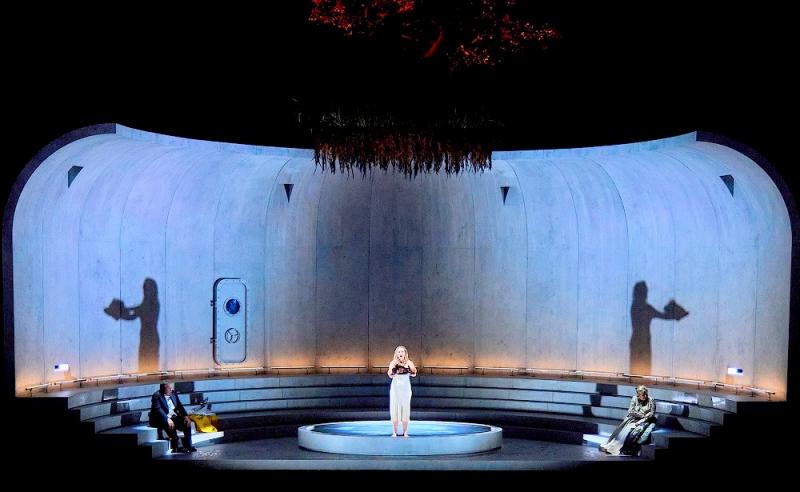
“Based on the play by Oscar Wilde,” declared publicity on Dublin buses and buildings, reminding opera-cautious citizens that the poet whose text Richard Strauss used for his own Salome grew up only 10 minutes’ walk away from Daniel Libeskind's Bord Gáis Energy Theatre. Word of mouth, meanwhile, did much in a mere week of performances to spread the news that Sinéad Campbell Wallace’s interpretation of the fast-unravelling teenage princess was a sensation.
The instant standing ovation at the end on Saturday night may be typical for Dublin, but the deafening and sustained cheers, more like acclaim for a pop star, were not. They were richly earned. Campbell Wallace's lyric-dramatic soprano is more handsome than beautiful, but she covered the dynamic gamut of this fearsome role in a way that Strauss would surely have applauded, with an especially terrifying lower register and some surprisingly affecting soft singing.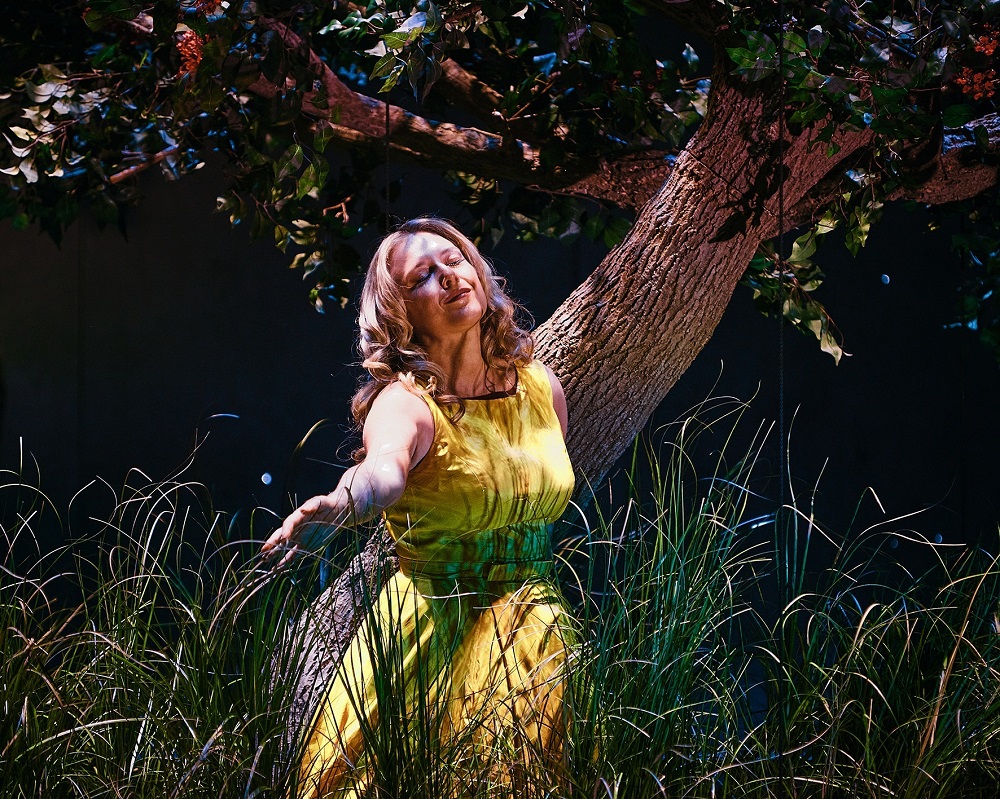 Salome's transformation from curious innocent (pictured above) in a depraved world to a monster for whom we still feel some pity could not have been more fine-tuned. In that, Campbell Wallace went to the limits in tandem with director Bruno Ravella's layered psychological drama.
Salome's transformation from curious innocent (pictured above) in a depraved world to a monster for whom we still feel some pity could not have been more fine-tuned. In that, Campbell Wallace went to the limits in tandem with director Bruno Ravella's layered psychological drama.
Everything in this total piece of music-theatre helped in that impact, with equal strengths from designer Leslie Travers' bunker set, not without its hallucinatory natural beauties, and Fergus Sheil's transparent 68-piece orchestra. Strauss's two long stretches of non-vocal music were used to turn the screw on Salome's steady degradation. The interlude after Jokanaan returns to his cistern prison, having cursed the girl who's obsessed over him, focused all attention on our so-far-heroine: bedraggled by the water in the pool beneath the initially semi-Eden garden of reeds and a tree with half blood-red leaves, the roots having dripped further rain as the fundamentalist Prophet calms down and baptises Salome (pictured below), her face takes on a hardness which ages her at least 10 years. The dance to get what she wants, cleverly choreographed by Liz Roche for a supple but not (I presume) ballet-trained singer, initially caters for stepfather Herod's fantasy, with Ciarán Bagnall's lighting giving shadow dancers either side of Salome, but turns wild when the music does, ending in crazed water-splashes. 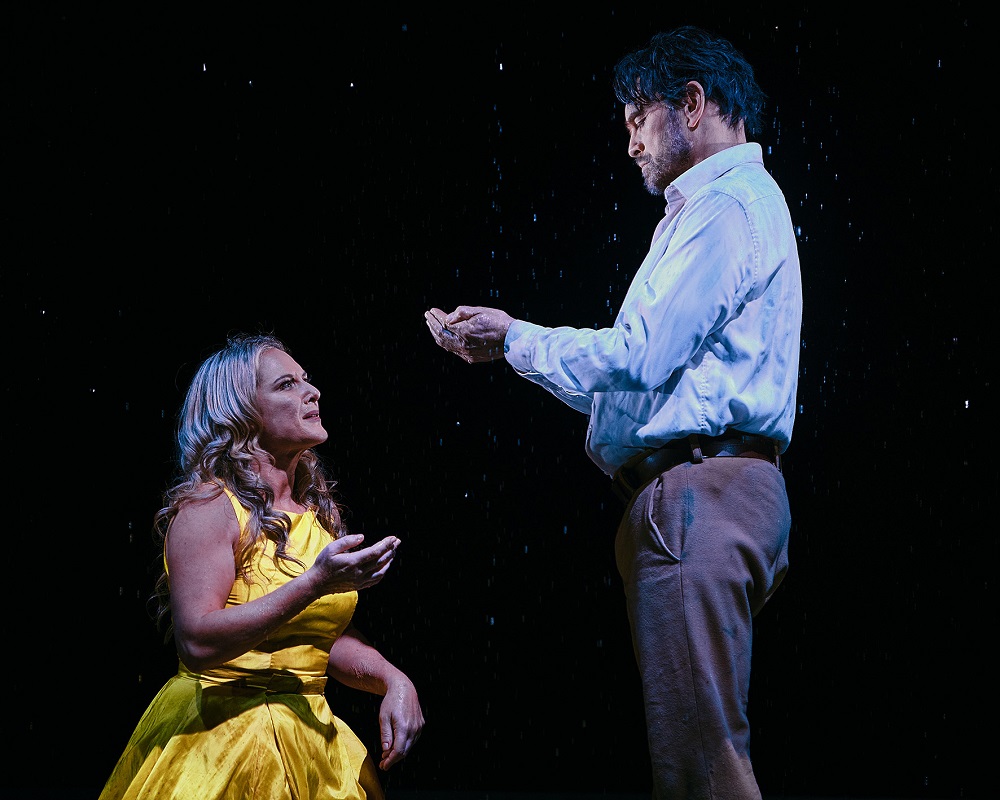 Ravella has pared down the surrounding business, so that much of the scene when Herod's court is supposed to arrive on stage keeps it between him, his monstrous, self-satisfied second wife - Imelda Drumm hits the dudgeon spot-on - and his step-daughter: the ultimate dysfunctional family (it's piquant that just before Salome, Strauss had composed a comic-epic symphonic poem about a fundamentally happy trio - himself, his wife Pauline and their son Franz or "Bubi" - in the Symphonia Domestica) - and the Herods are the only participants in the discombobulating final scene.
Ravella has pared down the surrounding business, so that much of the scene when Herod's court is supposed to arrive on stage keeps it between him, his monstrous, self-satisfied second wife - Imelda Drumm hits the dudgeon spot-on - and his step-daughter: the ultimate dysfunctional family (it's piquant that just before Salome, Strauss had composed a comic-epic symphonic poem about a fundamentally happy trio - himself, his wife Pauline and their son Franz or "Bubi" - in the Symphonia Domestica) - and the Herods are the only participants in the discombobulating final scene.
Everything Herod needs - wine, fruit, a silver platter - is obligingly served by an efficient maid. Religious factions squabbling over interpretation are left as dinner-jacketed loudmouths driving Salome to further depths of despair, not "Jews" per se (and the calm Nazarenes get to wade in the once again baptismal water). It's a tricky scene to clarify, but done to musical and dramatic perfection here (pictured below). 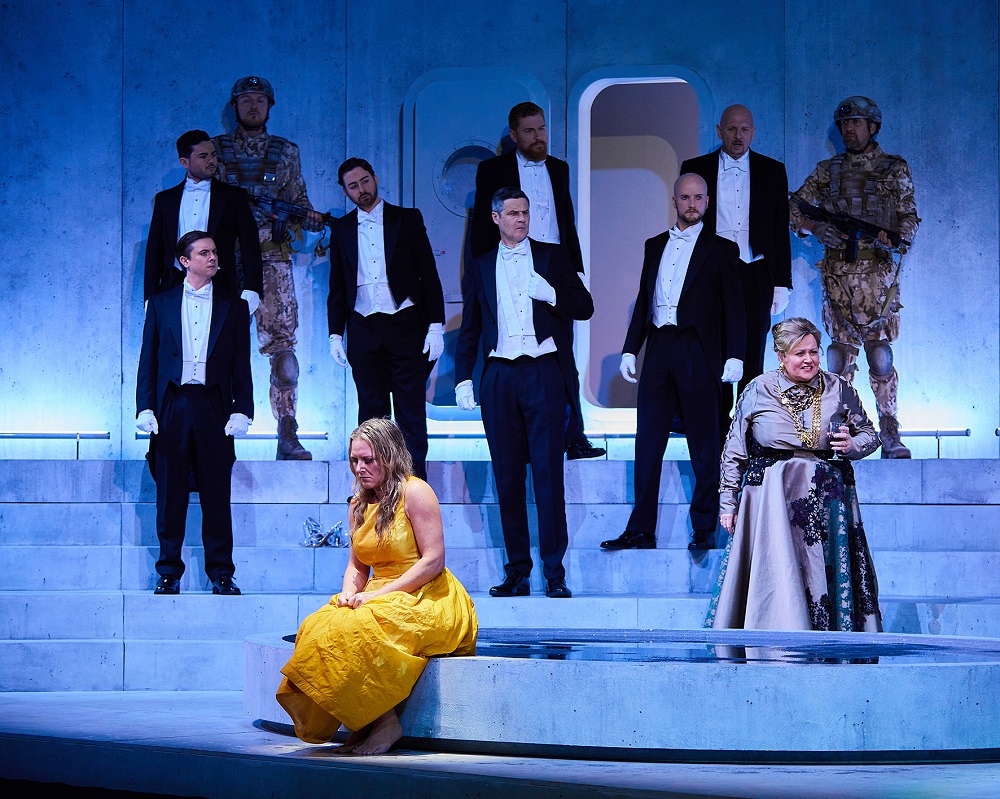 If there's a weakness, it's in the look and sound of Jokanaan. Surely not a smart suit for a man who's been imprisoned? And need Tómas Tómasson bark so relentlessly? The Prophet has his horrid side, as responsible as anyone for Salome's mental disintegration, but there should also be a calm and noble aspect to his preaching. This was a wild man in all the wrong ways; though Ravella gauges the relationship between him and Salome well. The at first chaste princess paces the steps above the pool, only coming dangerously close by steady degrees. Vincent Wolfsteiner's Herod is perfect, though - were this a character-tenor voice, it wouldn't carry the demands of his mounting desperation, but the heroics here are matched to a mix of creepiness and comedy. Lovestruck army man Narraboth whose paeans to the beauty of his princess begin the drama has a stronger than usual sound from Alex McKissick, but this is another tenor role superbly sung. Some of the other smaller roles need to realise they don't have to force or be over-declamatory in the Bord Gáis venue - the sound carries well and the orchestra never drowns them out.
If there's a weakness, it's in the look and sound of Jokanaan. Surely not a smart suit for a man who's been imprisoned? And need Tómas Tómasson bark so relentlessly? The Prophet has his horrid side, as responsible as anyone for Salome's mental disintegration, but there should also be a calm and noble aspect to his preaching. This was a wild man in all the wrong ways; though Ravella gauges the relationship between him and Salome well. The at first chaste princess paces the steps above the pool, only coming dangerously close by steady degrees. Vincent Wolfsteiner's Herod is perfect, though - were this a character-tenor voice, it wouldn't carry the demands of his mounting desperation, but the heroics here are matched to a mix of creepiness and comedy. Lovestruck army man Narraboth whose paeans to the beauty of his princess begin the drama has a stronger than usual sound from Alex McKissick, but this is another tenor role superbly sung. Some of the other smaller roles need to realise they don't have to force or be over-declamatory in the Bord Gáis venue - the sound carries well and the orchestra never drowns them out.
Sheil's magnificent musicians carry the expressiveness from moonstruck clarinet to cavernous contrabassoon and tuba, and while the conductor's burn is relatively slow, you feel the tension mounting in Strauss's magnificently paced thriller (is this his most amazing score?) Unlike several bewildering recent productions, this one doesn't dispense with the essentials: the moon, the dance, the head on a salver. Everything about the love-transfiguration gone wrong is disturbingly right: the play with the silver platter, the amount of blood transferred from severed head to Salome's now-scant clothing, above all Campbell Wallace's untiring switch between steely brilliance and aching tenderness for what might have been. There's even a suggestion that, despite Jokanaan's prophecy of her being stoned to death coming true, she follows him into the darkness, Wagnerian Liebestod accomplished.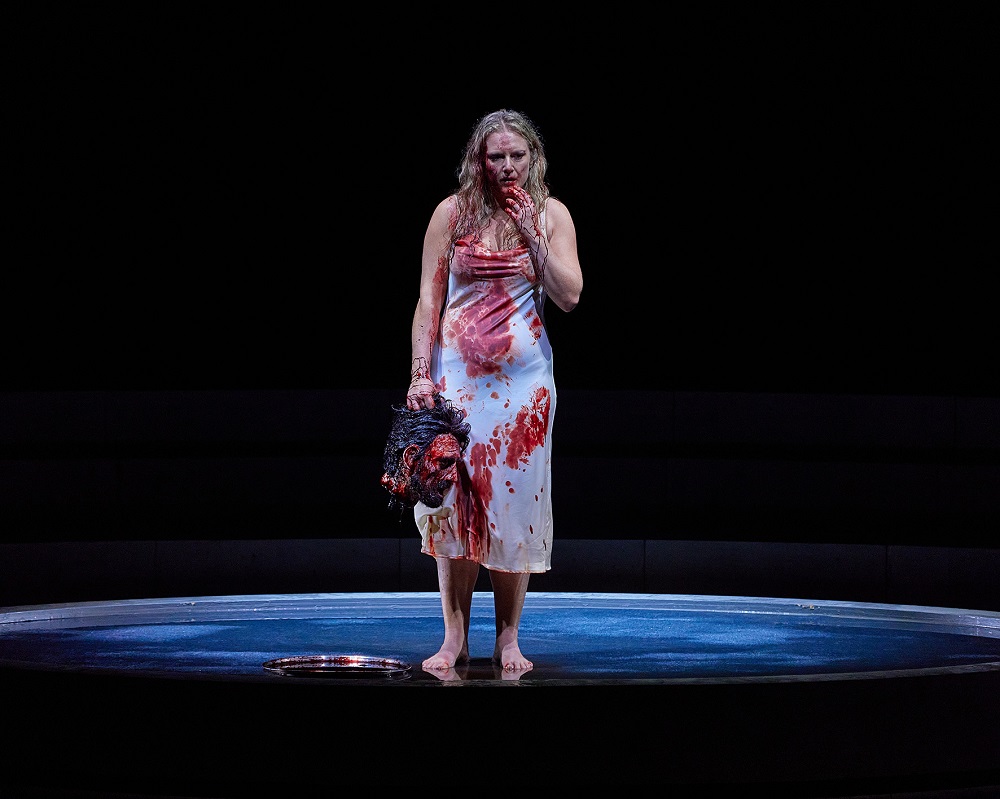 It's a total performance, in short, from another Irish diva following the three who did such a superlative job in Ravella's gorgeous, detailed take on Der Rosenkavalier when it arrived at Irish National Opera, and for that matter the electrifying performance of another Irish soprano and Salome-in-waiting Jennifer Davis as Janáček's Jenůfa at English National Opera (I feel fortunate to have seen both within three days). The good news is that this Salome has been filmed for imminent transmission on OperaVision. The company's track record remains unblemished, the mounting challenges fearlessly faced.
It's a total performance, in short, from another Irish diva following the three who did such a superlative job in Ravella's gorgeous, detailed take on Der Rosenkavalier when it arrived at Irish National Opera, and for that matter the electrifying performance of another Irish soprano and Salome-in-waiting Jennifer Davis as Janáček's Jenůfa at English National Opera (I feel fortunate to have seen both within three days). The good news is that this Salome has been filmed for imminent transmission on OperaVision. The company's track record remains unblemished, the mounting challenges fearlessly faced.
- Filmed for future screening on the free channel OperaVision
- More opera reviews on theartsdesk
The future of Arts Journalism
You can stop theartsdesk.com closing!
We urgently need financing to survive. Our fundraising drive has thus far raised £49,000 but we need to reach £100,000 or we will be forced to close. Please contribute here: https://gofund.me/c3f6033d
And if you can forward this information to anyone who might assist, we’d be grateful.

Subscribe to theartsdesk.com
Thank you for continuing to read our work on theartsdesk.com. For unlimited access to every article in its entirety, including our archive of more than 15,000 pieces, we're asking for £5 per month or £40 per year. We feel it's a very good deal, and hope you do too.
To take a subscription now simply click here.
And if you're looking for that extra gift for a friend or family member, why not treat them to a theartsdesk.com gift subscription?
more Opera
 theartsdesk at Wexford Festival Opera 2025 - two strong productions, mostly fine casting, and a star is born
Four operas and an outstanding lunchtime recital in two days
theartsdesk at Wexford Festival Opera 2025 - two strong productions, mostly fine casting, and a star is born
Four operas and an outstanding lunchtime recital in two days
 The Railway Children, Glyndebourne review - right train, wrong station
Talent-loaded Mark-Anthony Turnage opera excursion heads down a mistaken track
The Railway Children, Glyndebourne review - right train, wrong station
Talent-loaded Mark-Anthony Turnage opera excursion heads down a mistaken track
 La bohème, Opera North review - still young at 32
Love and separation, ecstasy and heartbreak, in masterfully updated Puccini
La bohème, Opera North review - still young at 32
Love and separation, ecstasy and heartbreak, in masterfully updated Puccini
 Albert Herring, English National Opera review - a great comedy with depths fully realised
Britten’s delight was never made for the Coliseum, but it works on its first outing there
Albert Herring, English National Opera review - a great comedy with depths fully realised
Britten’s delight was never made for the Coliseum, but it works on its first outing there
 Carmen, English National Opera review - not quite dangerous
Hopes for Niamh O’Sullivan only partly fulfilled, though much good singing throughout
Carmen, English National Opera review - not quite dangerous
Hopes for Niamh O’Sullivan only partly fulfilled, though much good singing throughout
 Giustino, Linbury Theatre review - a stylish account of a slight opera
Gods, mortals and monsters do battle in Handel's charming drama
Giustino, Linbury Theatre review - a stylish account of a slight opera
Gods, mortals and monsters do battle in Handel's charming drama
 Susanna, Opera North review - hybrid staging of a Handel oratorio
Dance and signing complement outstanding singing in a story of virtue rewarded
Susanna, Opera North review - hybrid staging of a Handel oratorio
Dance and signing complement outstanding singing in a story of virtue rewarded
 Ariodante, Opéra Garnier, Paris review - a blast of Baroque beauty
A near-perfect night at the opera
Ariodante, Opéra Garnier, Paris review - a blast of Baroque beauty
A near-perfect night at the opera
 Cinderella/La Cenerentola, English National Opera review - the truth behind the tinsel
Appealing performances cut through hyperactive stagecraft
Cinderella/La Cenerentola, English National Opera review - the truth behind the tinsel
Appealing performances cut through hyperactive stagecraft
 Tosca, Royal Opera review - Ailyn Pérez steps in as the most vivid of divas
Jakub Hrůša’s multicoloured Puccini last night found a soprano to match
Tosca, Royal Opera review - Ailyn Pérez steps in as the most vivid of divas
Jakub Hrůša’s multicoloured Puccini last night found a soprano to match
 Tosca, Welsh National Opera review - a great company reduced to brilliance
The old warhorse made special by the basics
Tosca, Welsh National Opera review - a great company reduced to brilliance
The old warhorse made special by the basics
 BBC Proms: The Marriage of Figaro, Glyndebourne Festival review - merriment and menace
Strong Proms transfer for a robust and affecting show
BBC Proms: The Marriage of Figaro, Glyndebourne Festival review - merriment and menace
Strong Proms transfer for a robust and affecting show

Add comment